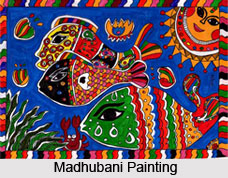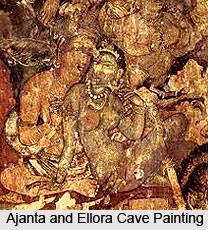 Indian paintings in ancient age involve the multiple forms of classical paintings, which developed in various parts of the country. The cave paintings of Ajanta and Ellora offer some of the most famous creations of the dexterous painters of India. However, ancient Indian paintings not only imply the different types of specialized paintings existent in many regions of the nation, but also the wide variety of beautiful paintings created by village artists and craftsmen. These paintings generally portrayed the regular lives of people, and pictures which painted the colours of a harmonized world. Natural, social and religious themes were adopted into these ancient paintings.
Indian paintings in ancient age involve the multiple forms of classical paintings, which developed in various parts of the country. The cave paintings of Ajanta and Ellora offer some of the most famous creations of the dexterous painters of India. However, ancient Indian paintings not only imply the different types of specialized paintings existent in many regions of the nation, but also the wide variety of beautiful paintings created by village artists and craftsmen. These paintings generally portrayed the regular lives of people, and pictures which painted the colours of a harmonized world. Natural, social and religious themes were adopted into these ancient paintings.Madhubani Paintings
Also known as 'Mithila painting', Madhubani painting is an ancient Indian painting which originated in the Mithila District of Bihar. Natural dyes are used in this art. Madhubani paintings are practiced during festive occasions like 'Holi', marriage, birth, 'Kali Puja', 'Upanayan' or thread ceremony and 'Durga Puja'. Commonly used colours are lamp black, reddish brown and ochre. Mithila paintings are done by the womenfolk of the towns of Darbhanga and Madhubani. Images of the sun, the 'tulsi' plant, royal events, weddings, etc.
 Cave Paintings
Cave PaintingsIndia possesses some of the most excellent rock-cut cave paintings like Ajanta and Ellora, etc. which contain paintings that are believed to be living masterpieces of the religious art of Buddhism. Many Pithalkhora Caves located in Maharashtra are decorated with colourful paintings which date back to the 4th century AD. Paintings of Bagh Caves in Madhya Pradesh, Badami Cave temples in Karnataka, Ravan Chhaya rock shelter in Orissa, Elephanta Caves, Bhaja Caves and others like Karsamble, Thanale, Kuda, Lenyadri, Tulja Lena and Manmod are the other reputed cave paintings found in ancient India. The ceiling of the Badami Cave temple consists of the portrait of a four-armed image of Lord Brahma, seated on His swan. Ancient Indian cave paintings are also present in Karnataka, known as 'Ravana Phadi'.
Mural Paintings
Mural paintings are said to be the earliest instances of ancient Indian paintings. Several Indian temples are embellished with flamboyant murals. Mythological figures and tales of many legendary accounts are depicted through murals. Religious themes are also imbibed in various ancient cave paintings of Kerala. Yellow ochre, terracotta and lamp black were mainly utilized for these paintings. Frescoes of Ajanta and Ellora Caves, Bagh Caves and Badami Caves are impressive mural paintings. Vinaya Pitaka has stated that portraits of kings, traders and merchants were painted on the walls of royal palaces in ancient India. The subjects of such creations were generally those of animals, deities, family scenes, human figures and stories from 'Jataka'. Mural paintings have been performed in several portions of India like Alchi and Hemis monasteries in Ladakh, Tabo Monastery in Himachal Pradesh, Bundi, Jodhpur, Jaipur, Ajmer, Deeg, Kerala and many others.
For more visit the link given below: